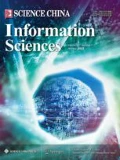Abstract
Low-density parity-check (LDPC)-coded modulation has attracted much attention for its outstanding performance in a bandwidth-limited channel. However, it involves relatively high decoding complexity. Owing to different convergence behaviors of variable nodes, the nodes detected early can be deleted from the Tanner graph, which reduces the size of the parity-check matrix iteration by iteration and thus the decoding complexity. In this paper, we propose a new decoding algorithm for LDPC-coded modulation with reduced complexity. In addition, by deleting the converged bits from the modulation constellation and updating the bit metrics of the demapper with the reduced constellation, more accurate estimation of the bits can be achieved. Simulation results show that, compared with conventional decoding schemes, the proposed method not only greatly reduces the overall decoding complexity for LDPC-coded modulation but also significantly improves decoding performance.
Similar content being viewed by others
References
Gallager R G. Low-density parity-check code. IRE Trans Inf Theory, 1962, IT-8: 21–28
MacKay D J C, Neal R M, Near Shannon limit performance of low density parity check codes. Electron Lett, 1996, 32: 1645–1646
Caire G, Taricco G, Biglieri E. Bit-interleaved coded modulation. IEEE Trans Inf Theory, 1998, 44: 927–946
Li X D, Chindapol A, Ritcey J A. Bit-interleaved coded modulation with iterative decoding and 8PSK signaling. IEEE Trans Commun, 2002, 50: 1250–1257
Brink S, Kramer G, Ashikhmin A. Design of low-density parity-check codes for modulation and detection. IEEE Trans Commun, 2004, 52: 670–678
Li Y, Ryan W E. Bit-reliability mapping in LDPC-coded modulation systems. IEEE Commun Lett, 2005, 9: 1–3
Hou J, Siegel P, Milstein L, et al. Capacity-approaching bandwidth-efficient coded modulation schemes based on low-density parity-check codes. IEEE Trans Inf Theory, 2003, 49: 2141–2155
Hou J, Yi Y, Lee M H. Multilevel LDPC codes design for multimedia communication CDMA system. EURASIP J Wirel Commun Netw, 2004, 1: 141–148
Ghaffar R, Knopp R. Reduced complexity soft detection for BICM MIMO OFDM system. In: 2nd International Conference on Computer, Control and Communication(IC4 2009), Karachi, 2009
Chen J, Dholakia A, Eleftheriou E, et al. Reduced complexity iterative decoding of LDPC codes. IEEE Trans Commun, 2005, 53: 1288–1299
Jiang X B, Nie Z H. Low computational complexity algorithms of LDPC decoder for CMMB. Chin J Electron, 2010, 38: 1612–1615
Shin D, Yang P H, Heo K, et al. A stopping criterion for low-density parity-check codes. IEICE Trans Commun, 2008, E91-B: 1145–1148
Lin C Y, Ku M K. Early detection of successful decoding for dual-diagonal block-based LDPC codes. IEEE Electron Lett, 2008, 44: 1368–1370
Zimmermann E, Ha J, Pattisapu P, et al. Reduced complexity LDPC decoding using forced convergence. In: 7th International Symposium on Wireless Personal Multimedia Communication, Abano Terme, 2004
Zimmermann E, Rave W, Fettweis G K. Forced convergence decoding of LDPC codes-EXIT chart analysis and combination with node complexity reduction techniques. In: 11th European Wireless Conference(EW’05), Nicosia, 2005
Aoyama R, Kaji Y. Improvement of the forced-convergence decoding for LDPC codes. In: International Symposium on Information Theory and Its Applications(ISITA 2008), Auckland, 2008
Hironori U, Kohsuke H. Complexity-reducing algorithm for serial scheduled min-sum decoding of LDPC codes. IEICE Trans Commun, 2009, E92-A: 2411–2417
Fan J X, Yang H W. A new forced convergence decoding scheme for LDPC codes. In: IEEE International Conference on Communications Technology and Applications (ICCTA), Beijing, 2009
Tanner R M. A recursive approach to low complexity codes. IEEE Trans Inf Theory, 1981, 27: 533–547
Hu X Y, Eleftheriou E, Arnold D M, et al. Efficient implementations of the sum-product algorithm for decoding LDPC codes. In: IEEE Globle Communications Conference (GlobleCom 2001), San Antonio, 2001
Fossorier M P C, Mihaljevic M, Imai H. Reduced complexity iterative decoding of low-density parity check codes based on belief propagation. IEEE Trans Commun, 1999, 47: 673–680
Chen J H, Fossorier M P C. Near optimum universal belief propagation based decoding of low-density parity-check codes. IEEE Trans Commun, 2002, 50: 406–414
Chen J H, Fossorier M P C. Density evolution for two improved BP-based decoding algorithms of LDPC codes. IEEE Commun Lett, 2002, 6: 208–210
Zhang J T, Fossorier M P C. Shuffled iterative decoding. IEEE Trans Commun, 2005, 53: 209–213
Chang Y M, Vila Casado A I, Chang M C F, et al. Lower-complexity layered belief-propagation decoding of LDPC codes. In: IEEE International Conference on Communications(ICC 2008), Beijing, 2008
Huang J, Zhang L J. Relative-residual-based dynamic schedule for belief propagation decoding of LDPC codes. China Commun, 2011, 8: 47–53
Fagervik K, Jeans T G. Low complexity bit by bit soft output demodulator. IEEE Electron Lett, 1996, 32: 985–987
Wang M M, Xiao W M, Brown T. Soft decision metric generation for QAM with channel estimation error. IEEE Trans Commun, 2002, 50: 1058–1061
Lin D S, Xiao Y, Li S Q. Low complexity soft decision technique for gray mapping modulation. Wirel Pers Commun, 2010, 52: 383–392
Zou X L, Liu W Y, Feng G Z. Performance of iteratively decoded bit-interleaved coded modulation with chaos based interleaving strategies. Sci China Inf Sci, 2010, 53: 833–841
Tran N H, Nguyen H H, Le-Ngoc T. Performance analysis and design criteria of BICM-ID with signal space diversity for keyhole Nakagami-m fading channels. IEEE Trans Inf Theory, 2009, 55: 1592–1602
IEEE Std 802:16TM-2004. IEEE standard for local and metropolitan area networks part 16: air interface for fixed broadband wireless access system, 2004
Dai L Y, Yang H W, Chen X G. Estimation error rate based on the radius of decision region (in Chinese). J Beijing Univ Posts Telecommun, 2011, 5: 66–69
Author information
Authors and Affiliations
Corresponding author
Rights and permissions
About this article
Cite this article
Dai, L., Yang, H., Fan, J. et al. Forced-convergence decoding for LDPC-coded modulation. Sci. China Inf. Sci. 56, 1–11 (2013). https://doi.org/10.1007/s11432-012-4710-8
Received:
Accepted:
Published:
Issue Date:
DOI: https://doi.org/10.1007/s11432-012-4710-8




